实验7
task1.c
点击查看代码
#include <stdio.h>
#define N 80
#define M 100
typedef struct {
char name[N]; // 书名
char author[N]; // 作者
} Book;
// 函数声明
void func1();
void func2();
int main() {
func1();
func2();
return 0;
}
// 函数func1定义
// 功能:把一组图书信息格式化写入文本文件
void func1() {
Book x[] = { {"《雕塑家》", "斯科特.麦克劳德"},
{"《灯塔》", "克里斯多夫.夏布特"},
{"《五号屠宰场》", "库尔特.冯内古特"},
{"《出卖月亮的人》", "罗伯特.海因莱茵"},
{"《大地之上》", "罗欣顿·米斯特里"},
{"《上学记》", "何兆武"},
{"《命运》", "蔡崇达"} };
int n, i;
FILE *fp;
// 计算数组x中元素个数
n = sizeof(x) / sizeof(Book);
// 以写的方式打开文本文件data1.txt
fp = fopen("data1.txt", "w");
// 如果打开文件失败,输出提示信息并返回
if(fp == NULL) {
printf("fail to open file\n");
return;
}
// 将结构体数组x中的图书信息写到fp指向的文件data1.txt
for(i = 0; i < n; ++i)
fprintf(fp, "%-20s %-20s\n", x[i].name, x[i].author);
fclose(fp);
}
// 函数func2定义
// 功能:从文本文件中格式化读取一组图书信息到数组,输出到屏幕,并显示行号
void func2() {
Book x[M];
int i, n;
FILE *fp;
// 以读的方式打开文本文件data1.txt
fp = fopen("data1.txt", "r");
// 如果打开文件失败,输出提示信息并返回
if(fp == NULL) {
printf("fail to open file\n");
return;
}
// 从文件中读取图书信息,保存到结构体数组x中
i = 0;
while(!feof(fp)) {
fscanf(fp, "%s%s", x[i].name, x[i].author);
++i;
}
n = i-1;
// 将图书信息打印输出到屏幕上
for(i = 0; i < n; ++i)
printf("%d. %-20s%-20s\n", i+1, x[i].name, x[i].author);
fclose(fp);
}
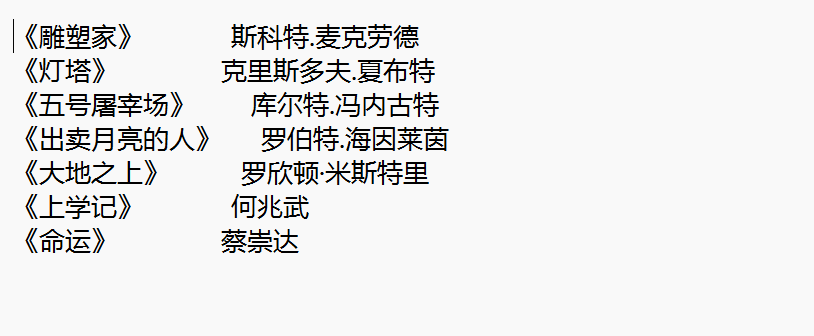

task2.c
点击查看代码
#include <stdio.h>
#define N 80
#define M 7
typedef struct {
char name[N]; // 书名
char author[N]; // 作者
} Book;
// 函数声明
void func1();
void func2();
int main() {
func1();
func2();
return 0;
}
// 函数func1定义
// 功能:将图书信息以数据块方式写入二进制文件data2.dat
void func1() {
Book x[M] = { {"《雕塑家》", "斯科特.麦克劳德"},
{"《灯塔》", "克里斯多夫.夏布特"},
{"《五号屠宰场》", "库尔特.冯内古特"},
{"《出卖月亮的人》", "罗伯特.海因莱茵"},
{"《大地之上》", "罗欣顿·米斯特里"},
{"《上学记》", "何兆武"},
{"《命运》", "蔡崇达"} };
int n, i;
FILE *fp;
// 以写的方式打开二进制文件data2.dat
fp = fopen("data2.dat", "wb");
// 如果打开文件失败,输出提示信息并返回
if(fp == NULL) {
printf("fail to open file\n");
return;
}
// 将结构体数组x中的图书信息以数据块方式写入文件data2.dat
fwrite(x, sizeof(Book), M, fp);
fclose(fp);
}
// 函数func2定义
// 功能:从二进制文件data2.dat以数据块方式读取图书信息,打印输出到屏幕,并显示行号
void func2() {
Book x[M];
int i;
FILE *fp;
// 以读的方式打开二进制文件data2.dat
fp = fopen("data2.dat", "rb");
// 如果打开文件失败,输出提示信息并返回
if(fp == NULL) {
printf("fail to open file\n");
return;
}
// 从文件data2.dat以数据块方式读入图书信息数据到结构体数组x
fread(x, sizeof(Book), M, fp);
// 在屏幕上输出结构体数组x中存储的图书信息
for(i = 0; i < M; ++i)
printf("%d. %-20s%-20s\n", i+1, x[i].name, x[i].author);
fclose(fp);
}

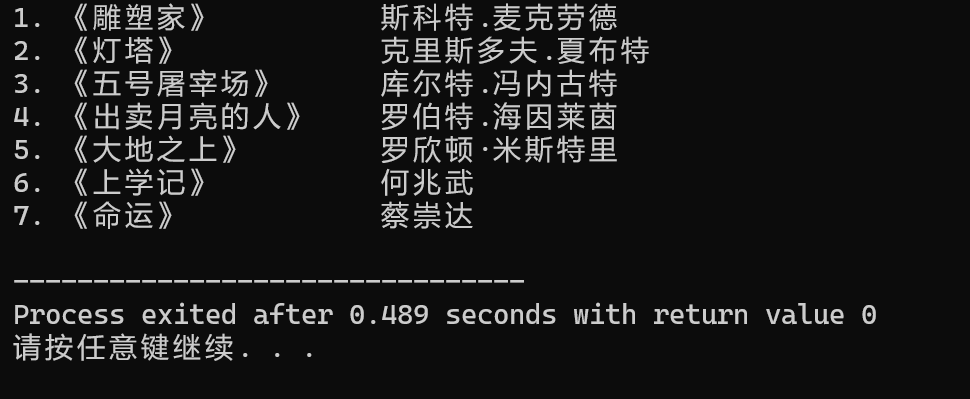
task2_2.c
点击查看代码
#include <stdio.h>
#define N 80
#define M 7
typedef struct {
char name[N]; // 书名
char author[N]; // 作者
} Book;
// 函数声明
void func1();
void func2();
int main() {
func1();
func2();
return 0;
}
// 函数func1定义
// 功能:将图书信息以数据块方式写入二进制文件data2.dat
void func1() {
Book x[M] = { {"《雕塑家》", "斯科特.麦克劳德"},
{"《灯塔》", "克里斯多夫.夏布特"},
{"《五号屠宰场》", "库尔特.冯内古特"},
{"《出卖月亮的人》", "罗伯特.海因莱茵"},
{"《大地之上》", "罗欣顿·米斯特里"},
{"《上学记》", "何兆武"},
{"《命运》", "蔡崇达"} };
int n, i;
FILE *fp;
// 以写的方式打开二进制文件data2.dat
fp = fopen("data2.dat", "wb");
// 如果打开文件失败,输出提示信息并返回
if(fp == NULL) {
printf("fail to open file\n");
return;
}
// 将结构体数组x中的图书信息以数据块方式写入文件data2.dat
fwrite(x, sizeof(Book), M, fp);
fclose(fp);
}
// 函数func2定义
// 功能:从二进制文件data2.dat以数据块方式读取图书信息,打印输出到屏幕,并显示行号
void func2() {
Book x[N];
int i, cnt;
FILE *fp;
// 以读的方式打开二进制文件data2.dat
fp = fopen("data2.dat", "rb");
// 如果打开文件失败,输出提示信息并返回
if(fp == NULL) {
printf("fail to open file\n");
return;
}
// 从文件data2.dat以数据块方式读入图书信息数据到结构体数组x
i = 0;
while(!feof(fp)) {
fread(&x[i], sizeof(Book), 1, fp);
i++;
}
cnt = i - 1;
// 在屏幕上输出结构体数组x中存储的图书信息
for(i = 0; i < cnt; ++i)
printf("%d. %-20s%-20s\n", i+1, x[i].name, x[i].author);
fclose(fp);
}
task3.c
点击查看代码
#include <stdio.h>
#define N 5
#define M 80
// 函数声明
void func1();
void func2();
void func3();
int main() {
func1();
func2();
func3();
return 0;
}
// 函数定义
// 功能:使用fputs()将一组字符串写入文本文件
void func1() {
// 定义字符指针数组,每个元素存放字符串的起始地址
char *ptr[N] = { "Working\'s Blues",
"Everything Will Flow",
"Streets of London",
"Perfect Day",
"Philadelphia"};
int i;
FILE *fp;
fp = fopen("data3.txt", "w");
if(fp == NULL) {
printf("fail to open file\n");
return;
}
for(i = 0; i < N; ++i) {
fputs(ptr[i], fp); // 把ptr[i]指向的字符串写入fp指向的文件中
fputs("\n", fp);
}
fclose(fp);
}
// 函数func2定义
// 功能:使用fgets()从文件中读取字符串并在屏幕上显示
void func2() {
char songs[N][M];
int i;
FILE *fp;
fp = fopen("data3.txt", "r");
if(fp == NULL) {
printf("fail to open file\n");
return;
}
for(i = 0; i < N; ++i)
fgets(songs[i], 80, fp);
for(i = 0; i < N; ++i)
printf("%d. %s", i+1, songs[i]);
fclose(fp);
}
// 函数func3定义
// 功能:使用fetc从文件中逐个字符读取数据,打印输出到屏幕上
void func3() {
char ch;
FILE *fp;
fp = fopen("data3.txt", "r");
if(fp == NULL) {
printf("fail to open file\n");
return;
}
while(!feof(fp)) {
ch = fgetc(fp);
if(ch == EOF)
break;
putchar(ch);
}
fclose(fp);
}
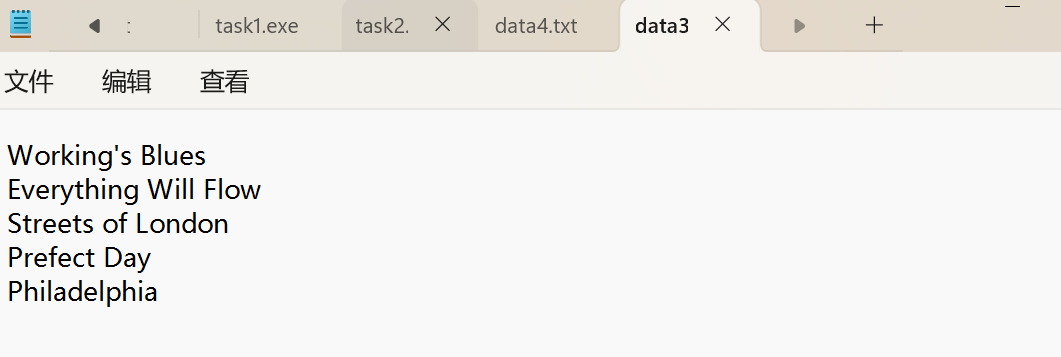
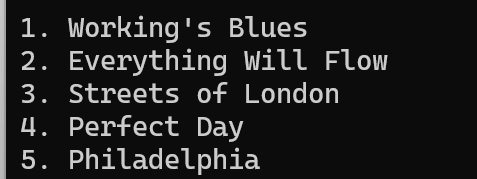
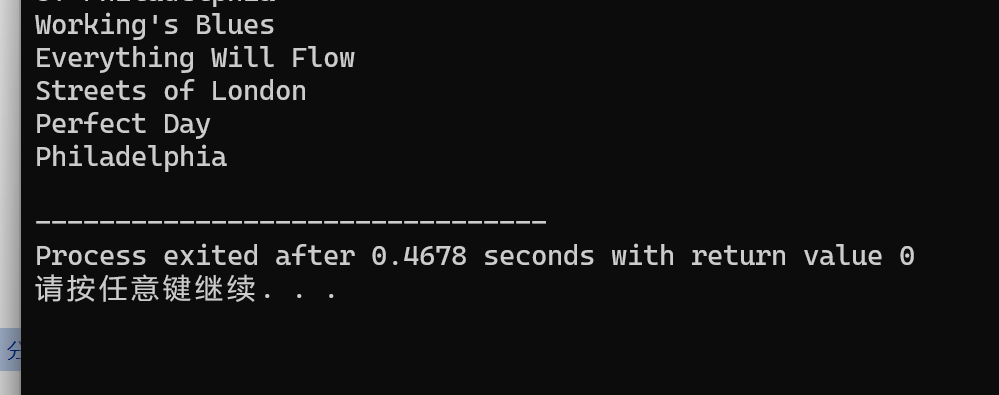
答:反斜杠\不打印输出。
task4.c
点击查看代码
#include <stdio.h>
int main() {
int count = 0;
int ch;
FILE *fp;
fp = fopen("data4.txt", "r");
if (fp == NULL) {
printf("fail to open file\n");
return 1;
}
while ((ch = fgetc(fp)) != EOF) {
if (!(ch == ' ' || ch == '\n' || ch == '\t')) {
count++;
}
}
printf("data4.txt中共包含字符数(不记空白符):%d\n", count);
fclose(fp);
return 0;
}


task5.c
点击查看代码
#include <stdio.h>
#include <string.h>
#include <stdlib.h>
#define N 10
typedef struct {
long int id;
char name[20];
float objective; // 客观题得分
float subjective; // 操作题得分
float sum; // 总分
char ans[10]; // 考试结果
} STU;
// 函数声明
void finput(STU st[], int n);
void foutput(STU st[], int n);
void output(STU st[], int n);
int process(STU st[], int n, STU st_pass[]);
int main() {
STU stu[N], stu_pass[N];
int cnt;
double pass_rate;
printf("从文件读入%d个考生信息...\n", N);
finput(stu, N);
printf("\n对考生成绩进行统计...\n");
cnt = process(stu, N, stu_pass);
printf("\n通过考试的名单:\n");
output(stu_pass, cnt); // 输出到屏幕
foutput(stu_pass, cnt); // 输出到文件
pass_rate = 1.0 * cnt / N;
printf("\n本次等级考试通过率: %.2f%%\n", pass_rate*100);
return 0;
}
// 把通过考试的考生完整信息输出到屏幕上
// 准考证号,姓名,客观题得分,操作题得分,总分,结果
void output(STU st[], int n) {
int i;
printf("准考证号\t姓名\t客观题得分\t操作题得分\t总分\t\t结果\n");
for (i = 0; i < n; i++)
printf("%ld\t\t%s\t%.2f\t\t%.2f\t\t%.2f\t\t%s\n", st[i].id, st[i].name, st[i].objective, st[i].subjective, st[i].sum, st[i].ans);
}
// 从文本文件examinee.txt读入考生信息:准考证号,姓名,客观题得分,操作题得分
void finput(STU st[], int n) {
int i;
FILE *fin;
fin = fopen("examinee.txt", "r");
if (fin == NULL) {
printf("fail to open file\n");
exit(0);
}
while (!feof(fin)) {
for (i = 0; i < n; i++)
fscanf(fin, "%ld %s %f %f", &st[i].id, st[i].name, &st[i].objective, &st[i].subjective);
}
fclose(fin);
}
// 把通过考试的考生完整信息写入文件list_pass.txt
// 准考证号,姓名,客观题得分,操作题得分,总分,结果
void foutput(STU s[], int n) {
FILE *fout;
int i;
// 保存到文件
fout = fopen("list_pass.txt", "w");
if (!fout) {
printf("fail to open or create list_pass.txt\n");
exit(0);
}
fprintf(fout, "准考证号\t\t姓名\t客观题得分\t操作题得分\t总分\t\t结果\n");
for (i = 0; i < n; i++)
fprintf(fout, "%ld\t\t%s\t%.2f\t\t%.2f\t\t%.2f\t\t%s\n", s[i].id, s[i].name, s[i].objective, s[i].subjective, s[i].sum, s[i].ans);
fclose(fout);
}
// 对考生信息进行处理:计算每位考生考试总分、结果;统计考试通过的人数
int process(STU st[], int n, STU st_pass[]) {
int i;
int count = 0;
for (i = 0; i < n; i++) {
st[i].sum = st[i].objective + st[i].subjective;
if (st[i].sum > 60) {
strcpy(st[i].ans, "pass");
st_pass[count] = st[i];
count++;
}
else
strcpy(st[i].ans, "fail");
}
return count;
}
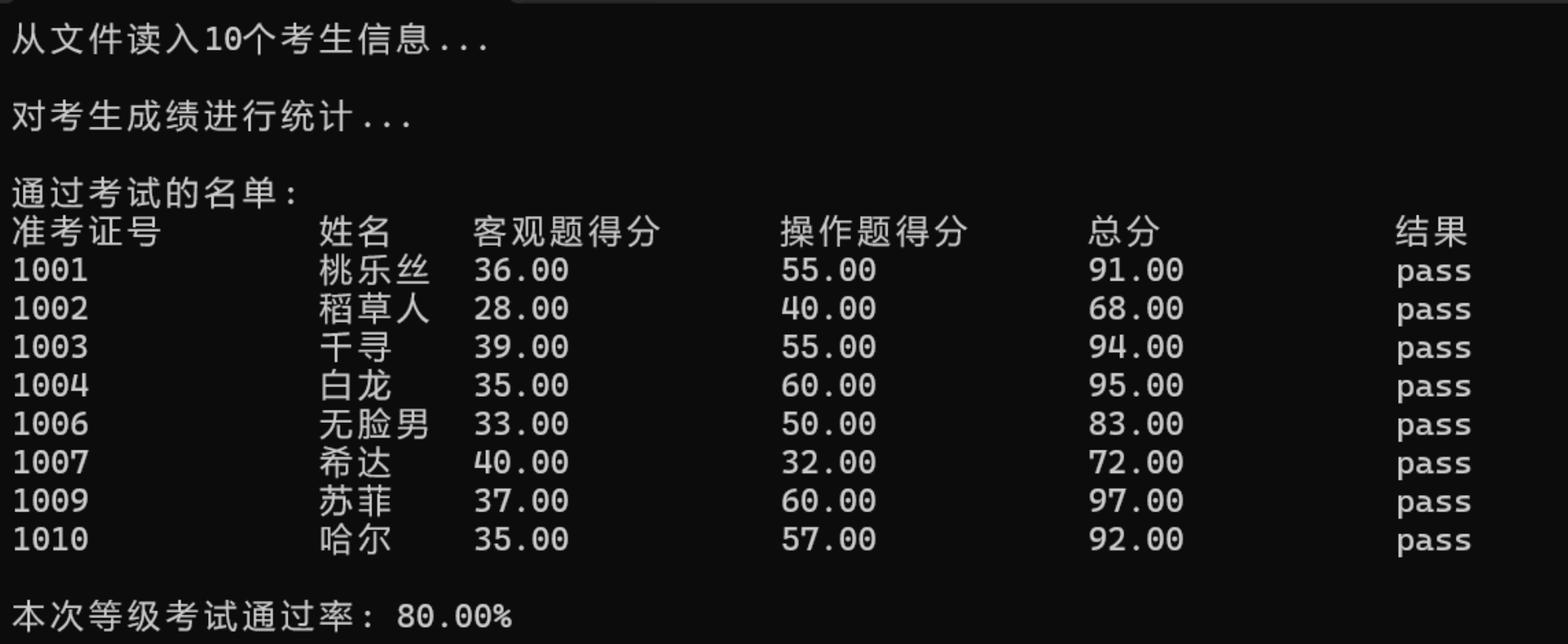
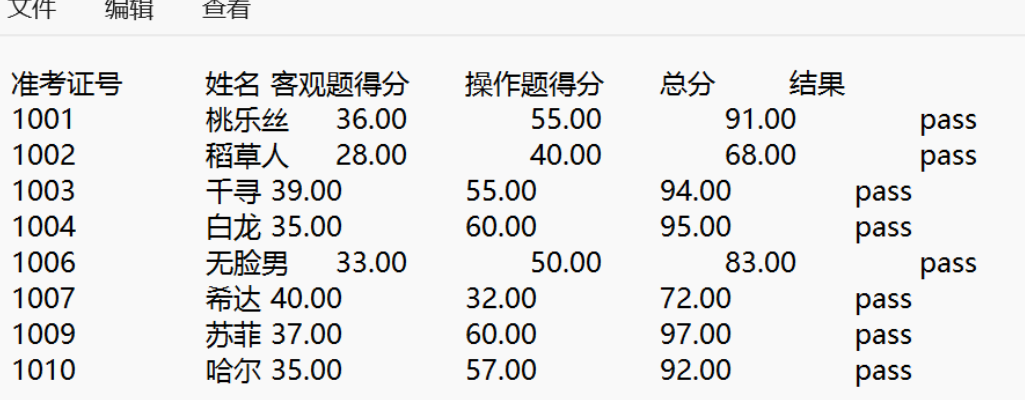
task6.c
点击查看代码
#include<stdio.h>
#include<stdlib.h>
#include<time.h>
#define N 80
typedef struct {
long num;
char name[20];
char class[20];
}STU;
int main(){
STU stu[N];
int x[5];
int i,j;
int k,t=0;
FILE *fp;
FILE *ptr;
fp=fopen("list.txt","r");
if(fp==NULL){
printf("fail to open \n");
return 1;
}
ptr=fopen("lucky.txt","w");
if(ptr==NULL){
printf("fail to open file\n");
return 1;
}
while(!feof(fp)){
for(i=0;i<N;++i)
fscanf(fp,"%ld %s %s",&stu[i].num ,stu[i].name ,stu[i].class );
}
fclose(fp);
srand(time(NULL));
k = rand() % N;
x[0]=k;
printf("%ld %-10s %-20s\n", stu[k].num, stu[k].name, stu[k].class);
fprintf(ptr, "%ld %-10s %-20s\n", stu[k].num, stu[k].name, stu[k].class);
for (i = 1; i < 5; ++i) {
k = rand() % N;
x[i]=k;
for (j = 0; j < i; ++j) {
if (x[i] == x[j]) {
t=1;
}
}
if(t==0){
printf("%ld %-10s %-20s\n", stu[k].num, stu[k].name, stu[k].class);
fprintf(ptr, "%ld %-10s %-20s\n", stu[k].num, stu[k].name, stu[k].class);
}
if(t==1){
i=i-1;
}
}
fclose(ptr);
return 0;
}
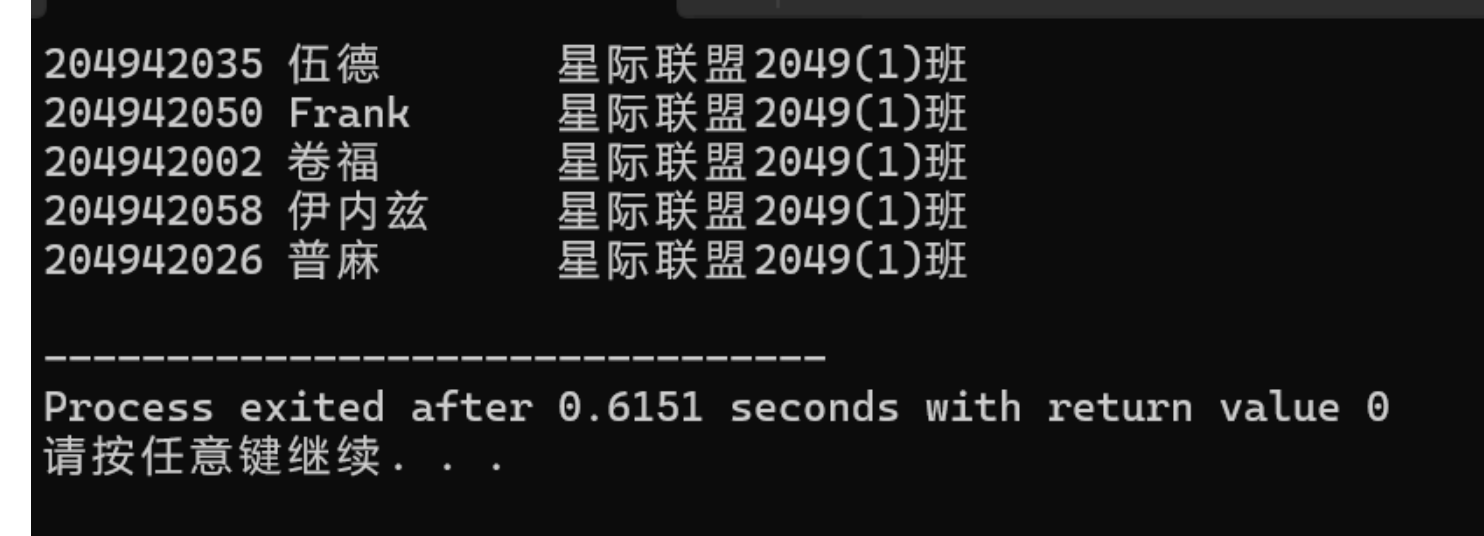




 浙公网安备 33010602011771号
浙公网安备 33010602011771号